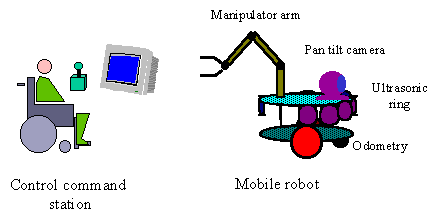
ARPH : Assistance by Robot to People with Handicap

Disabled people aid has been developed for several years. Mobile robotics can help for it. Defined with AFM (French Association against Myopathies), the aim of RMI project (Intelligent Mobile Robot) is to embark a manipulator arm on an autonomous mobile base to give to disabled people possibility to realise themselves everyday life tasks.
These kinds of project are possible only under two constraints. The first one is to define correctly the real need of the disabled people. Specially, AFM insists on the human operator's will to act by itself: robot must not do for the person but must palliate its deficiencies. The second constraint is a financial one. Indeed, cost of the assistance must be sufficiently low to allow disabled people to access it. That imposes choices about sensors used: odometry and ultrasonic sensors with mean telemetric capacities.
This field of research naturally induces to be interested in Man-Machine Co-operation (MMC). Indeed, two entities (man and machine) have perception, decision and actions means. In the first step of the work autonomy of the mobile base has been studied (planing, navigation, localisation). It is described in my thesis report and has been published in several papers. The second step deals with MMC itself. The different tasks to realise are shared between the two entities for the mission to develop in the best satisfactory conditions for the operator. Localisation error detection, mobile base control and manipulator command are tasks shared by man and machine. An evolving Man-Machine Interface (MMI) is studied to be adapted to each person depending on handicap, its state of fatigue, robot capacities and state of the running mission.
Key words : Man-Machine Co-operation, Disabled people robotic assistance, Virtual Reality, Planing, Navigation, Localisation, Ultrasonic sensors.